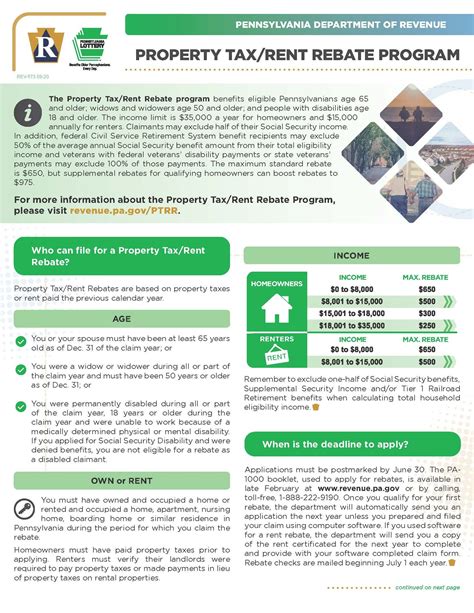Property tax rent rebates are financial assistance programs designed to help eligible renters offset some of their rental costs, particularly the burden of property taxes that landlords often pass on to tenants. Understanding these rebates can offer substantial savings, particularly for low-income households, seniors, and people with disabilities. This guide will delve into the various aspects of property tax rent rebates, providing a comprehensive overview of applications, eligibility, benefits, and tips to maximize savings.
What Are Property Tax Rent Rebates?
Property tax rent rebates are refunds provided by state governments to qualifying renters who pay property taxes indirectly through their rent payments. The purpose of these rebates is to alleviate financial burdens for those who may struggle to keep up with housing costs, while also stimulating economic stability in the housing market.
Eligibility Requirements
Eligibility for property tax rent rebates varies from state to state, but there are commonly accepted criteria that most programs follow:
- Income Limits: Applicants typically must reside within specified income thresholds, often measured against the federal poverty level or median income benchmarks.
- Age or Disability Status: Many states prioritize assistance for seniors (usually 65 and older) and people with disabilities.
- Residency Requirements: The applicant must be a resident of the state offering the rebate for a minimum amount of time, often measured in years.
- Qualified Rental Payments: Tenants must have a documented rental payment history, proving they contribute to their housing expenses.
Application Process
The application process for property tax rent rebates generally follows the steps outlined below:
- Gather Necessary Documentation: Collect proof of income, rental agreements, and any relevant identification documents, such as a driver’s license or Social Security card.
- Complete the Application Form: Most states offer downloadable forms online or may require applicants to apply in person. Ensure all required sections are filled out accurately.
- Submit Your Application: Follow the submission guidelines provided by your state. Applications can usually be submitted online, by mail, or in person at designated offices.
- Await Processing: Processing times can vary widely. Stay informed by checking your application’s status online or by contacting your local government office.
Benefits of Property Tax Rent Rebates
The benefits of property tax rent rebates can be significant:
- Financial Relief: Rebates can provide much-needed cash flow for low-income renters, helping them maintain financial stability.
- Encourages Homeownership: By relieving some of the tax burdens, these programs can make homeownership more accessible for qualifying renters down the line.
- Community Strengthening: Enhanced financial stability within the community can lead to lower eviction rates and stronger neighborhood ties.
- Economic Impact: When residents feel secure, they’re more likely to spend money locally, boosting local economies.
Tips for Maximizing Savings
To make the most of property tax rent rebates, consider the following strategies:
- Stay Informed: Keeping yourself updated on the latest changes to rebate programs will help ensure you don’t miss out on any available assistance.
- Consult Local Resources: Reach out to local community organizations, housing authorities, or agencies that specialize in renters’ rights for assistance with applications and resources.
- Keep Accurate Records: Maintaining well-organized records of your rental payments and financial documents can streamline the application process and prevent delays.
Conclusion
Property tax rent rebates present a valuable opportunity for renters to alleviate the financial strain associated with housing costs. By understanding eligibility requirements, navigating the application process, and maximizing available resources, individuals and families can unlock significant savings. Whether you are a senior citizen, someone with a disability, or a low-income tenant, exploring these rebate programs can lead to enhanced financial security and stability. Now is the time to take control of your finances and explore what savings await through property tax rent rebates.
FAQs
1. How do I know if I qualify for a property tax rent rebate?
Qualification criteria depend on your state. Generally, you need to meet specific income levels, residency requirements, and possibly age or disability status. Consult your state’s revenue department for detailed guidelines.
2. What kind of documentation will I need to apply?
You will typically need proof of income, your rental agreement, and identification documents. Some states may have specific requirements, so check your local guidelines.
3. How long does it take to receive a rebate after applying?
Processing times vary depending on the state and the volume of applications received. Generally, it can take anywhere from a few weeks to several months. It’s good practice to check the status of your application through the state’s designated channels.
4. Can I apply for a property tax rent rebate every year?
Yes, as long as you continue to meet the eligibility requirements, you can apply for property tax rent rebates annually. Be sure to check for any changes in the guidelines each year.
5. Are property tax rent rebates only available for low-income individuals?
While low-income individuals are the primary beneficiaries of these programs, states often provide additional criteria regarding age, disability, and residency that could allow for broader eligibility.
This HTML format is appropriate for inclusion in a WordPress site and follows typical article structure, ensuring clarity and easy navigation for readers.
Download Property Tax Rent Rebate
